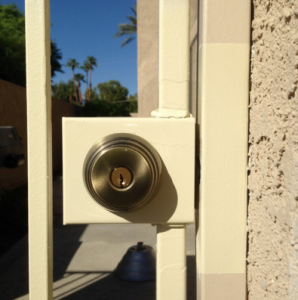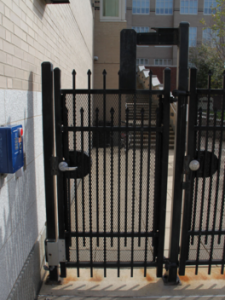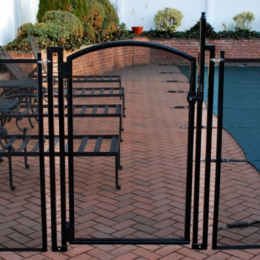4 Options Of Locks For Your Gate
Security is imperative for your home and property. You must take necessary steps to ensure that your home and property are safe. If you are careless about the safety and security of your home then you might have troubles in the future. The first step that you can take is to properly lock the gates of your home to ensure your property is safe. Locks are being used for a long time now. As time passes by, and with the advancement of technology, locks are being evolved into modern locks. So today you can see different options of locks for your gate. They are discussed as below:
Resources:
Gilbert Locksmith Pros
lowes.com
schlage.com
 Deadbolt Lock – Deadbolt door lock is the most popular lock as it provides maximum security to the home owner. It helps to prevent intruders from prying the door open as it locks the door to the frame. It is called “dead” bolt lock because there are no springs to operate the bolt. It can be manually operated using a thumb turn from inside or a key. It has a 1 inch throw, which is the industry standard, that is the extension from the lock housing. The deadbolt locks are specially designed to fit in specific holes and backsets. The distance between the center of the handle and the edge of the door is called a backset. This lock comes in both single cylinder and double cylinder types. The single cylinder deadbolt lock can be operated with a turn button on the inside and with a key from the outside. It is mostly used on doors made from solid wood or heavy metals. The double cylinder deadbolt locks can be operated with a key both from the inside and the outside. This type of lock is used in glass doors so that intruders cannot break the door to open from inside. One bad thing about double cylinder deadbolt locks is that, in case of an emergency where the key has been lost or misplaced, people can be trapped inside the home. So there are some areas in the United States that do not permit using this type of locks.
Deadbolt Lock – Deadbolt door lock is the most popular lock as it provides maximum security to the home owner. It helps to prevent intruders from prying the door open as it locks the door to the frame. It is called “dead” bolt lock because there are no springs to operate the bolt. It can be manually operated using a thumb turn from inside or a key. It has a 1 inch throw, which is the industry standard, that is the extension from the lock housing. The deadbolt locks are specially designed to fit in specific holes and backsets. The distance between the center of the handle and the edge of the door is called a backset. This lock comes in both single cylinder and double cylinder types. The single cylinder deadbolt lock can be operated with a turn button on the inside and with a key from the outside. It is mostly used on doors made from solid wood or heavy metals. The double cylinder deadbolt locks can be operated with a key both from the inside and the outside. This type of lock is used in glass doors so that intruders cannot break the door to open from inside. One bad thing about double cylinder deadbolt locks is that, in case of an emergency where the key has been lost or misplaced, people can be trapped inside the home. So there are some areas in the United States that do not permit using this type of locks.- Knob Lock – The most common type of lock that can be used for house gates is knob lock. They are used for different doors in your home like front door, patio door, garage door, bedroom door, etc. This lock has knobs on both the sides – inside and outside. One of the lock has a lock while the other side has a key hole that can be used to unlock the door using a key. This type of lock is available in two different type for use on either right side of the door or left side of the door. You must determine which side your door is opening to buy the right kind of door lock. It is suggested that you do not use this lock as the main security lock of your door as it may easily be broken. It has a locking mechanism that is placed inside the knob instead of being placed inside the door, so when a burglar tries to break in he can easily do so using a rock, hammer or wrench.
 Lever Handle Lock – This type of door lock is more stylish than standard knob locks, so they are commonly used on interior doors. They feel nice in your hand and also look pretty. The lever handle lock is commonly used by people who are handicapped. They can be locked using a push button but most of them do not require anything to unlock the door. This lock should be used in rooms inside the home but should not be used as the main security lock of your main door as it can easily be broken by intruders.
Lever Handle Lock – This type of door lock is more stylish than standard knob locks, so they are commonly used on interior doors. They feel nice in your hand and also look pretty. The lever handle lock is commonly used by people who are handicapped. They can be locked using a push button but most of them do not require anything to unlock the door. This lock should be used in rooms inside the home but should not be used as the main security lock of your main door as it can easily be broken by intruders.- Keyless Entry Pad Locks – The advancement in technology has led to the discovery of keyless entry pad locking system. It does not require any key to unlock the door but a numbered keypad is used to unlock the door. When the code is input then the slide of the deadbolt is opened. It is gaining a lot of popularity these days as many people are getting keyless entry pads as locking system of their home.
When you have decided one of the options of locks for your gate then you should hire an experienced professional to install the locking system for maximum security for your home and property.
Read More

